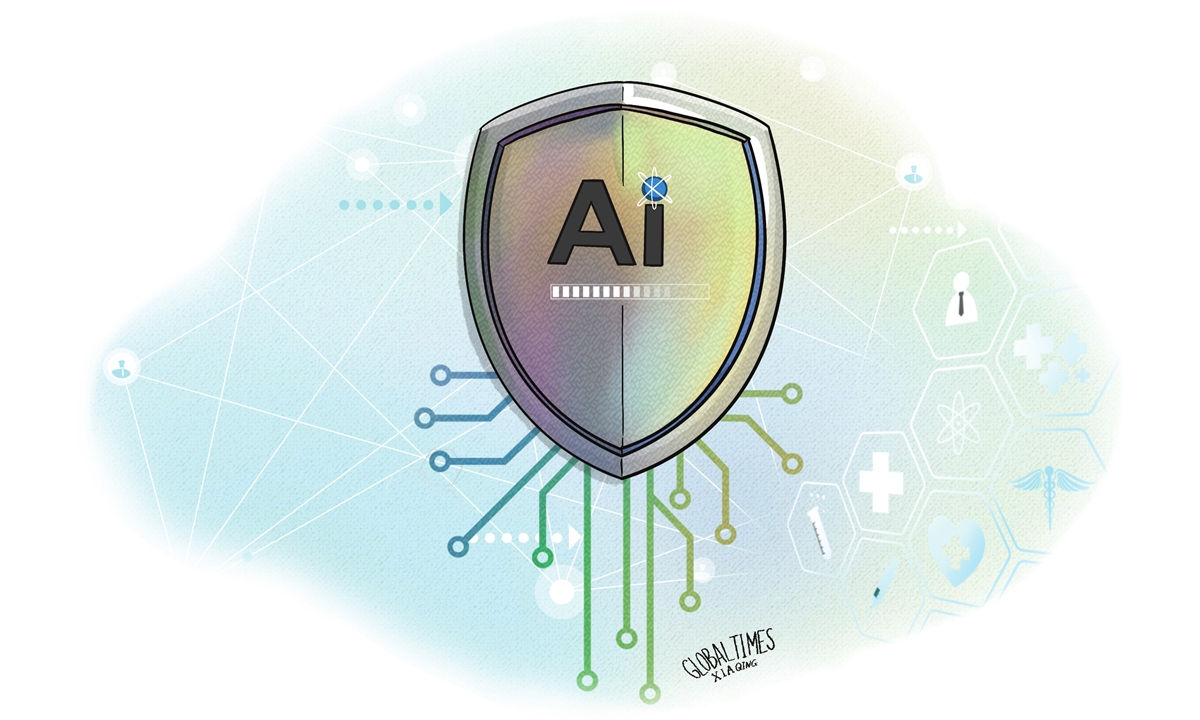
Illustration: Xia Qing/GT
The
mk winners of Nobel prizes in Chemistry and Physics this year include several artificial intelligence (AI) scientists, which has once again thrust AI technology into the spotlight.
While AI achievements have significantly advanced scientific progress, the sector's rapid development has also stirred debates and concerns about the potential risks and challenges that transcend technical concerns and encompass a complex array of factors, including legal frameworks, governance, social norms and even international relations.
Geoffrey Hinton, who won the 2024 Nobel Prize in Physics on Tuesday, warned of the potential dangers of AI technology. He told the award ceremony in Stockholm by telephone that "We also have to worry about a number of possible bad consequences - particularly the threat of these things getting out of control," according to the Financial Times. Hinton quit Google last year so he could speak more freely about the dangers of AI.
While the application of AI showcases its immense potential in tackling global challenges, driving technological advancement, and enhancing the quality of life, the rapid evolution of AI also presents significant risks and challenges, as noted by pioneers like Hinton. Navigating the future and establishing effective regulations have become matters of profound importance.
In light of the double-edged sword effect of AI technology, countries worldwide are increasingly recognizing the need for careful planning and emphasis on AI development. For instance, in May, the US Special Competitive Studies Project released "A Vision for Competitiveness: Mid-Decade Opportunities for Strategic Victory" that emphasizes America's leadership in the realm of artificial general intelligence (AGI) and suggests that the US must ensure its preparation for and response to AGI adheres to its values, laws and ethical frameworks.
Although the decision-making process of AI is based on algorithms and data, its widespread application touches upon multiple sensitive areas, potentially harboring risks. Effectively managing these risks while promoting development has become an urgent issue. This involves the construction of legal frameworks, the improvement of governance mechanisms and the adjustment of social norms, among other aspects. If these regulatory issues are not resolved, the further development of AI may encounter difficulties and could even lead to chaos.
China, recognized as one of the leaders in the AI realm, also faces AI governance issues. The resolution of these issues cannot be achieved by any single country alone; it requires the collective efforts and cooperation of the international community.
After years of efforts, China has showcased its remarkable strengths in data accumulation, technological innovation and practical applications, allowing it to play a pivotal role in global AI governance.
However, the current US strategy toward China, particularly its containment policies aimed at curbing China's rise in high-end technologies, poses significant risks to the overall progress of AI on a global scale. By attempting to restrict China's technological growth and sever the ties between Chinese manufacturing and technology, the US is actually fostering the emergence of two isolated technological ecosystems.
This bifurcation not only fails to impede China's AI development but also threatens to lead to chaos in the global economy as well as trade and technological advancement, further increasing the difficulty and complexity of global AI governance.
In October 2023, China introduced the Global AI Governance Initiative, which set the course for global AI development and governance. Promoting the development and application of AI technology necessitates technical collaboration and a commitment to safety and fairness throughout the development process.
Only by establishing effective cooperation and regulations on a global scale can we ensure the healthy development of AI technology and bring genuine benefits to human society.

